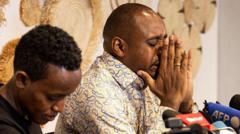**Former detainees recount harrowing experiences in clandestine prisons linked to political repression.**
**Unveiling Bangladesh's Hidden Horrors: The Secret Jail Near Dhaka Airport**

**Unveiling Bangladesh's Hidden Horrors: The Secret Jail Near Dhaka Airport**
**Revelations of secret detention facilities emerge in Bangladesh, revealing a dark chapter of human rights violations.**
When investigators broke through a concealed wall, they stumbled upon a series of hidden jail cells just a stone’s throw from Dhaka’s International Airport. A quickly erected brick barrier attempted to obscure the dire realities of what lay behind it. These clandestine rooms, dark and cramped, were waiting to be discovered. The breakthrough came courtesy of Mir Ahmad Bin Quasem, a former detainee held for eight long years, who vividly remembered the sounds of planes landing—a memory that ultimately led investigators to the secret military base in the area.
After protests saw Prime Minister Sheikh Hasina's government ousted in August, many victims have come forward, revealing widespread instances of unlawful killings and mistreatment in these hidden prisons run by the Elite Counter-Terrorism Unit, the Rapid Action Battalion (RAB). Prosecutors allege that these operations occurred with the direct approval of Hasina herself. However, the ruling party denies knowledge of the alleged atrocities, placing responsibility elsewhere.
Quasem, profoundly affected by his experiences, carries the burden of fear and trauma with him. He always conceals his identity with a hat and mask whenever he ventures outside, unwilling to show any vulnerability. "I always have to watch my back when I'm travelling," he admits.
As he guides the BBC through the dimness of the jail that confined him for eight years, Quasem recounts his ordeal of isolation, comparing the crushing weight of darkness to being buried alive, without a hint of day or night to break the monotony of despair. The small cells, some too tiny to stand in, now serve not just as a testament to his suffering but to a broader network of oppression—hundreds of such cells exist nationwide, echoing a systemic violation of human rights.
His narrative is echoed by others like Atikur Rahman Rasel, who still bears the physical and psychological scars of his captivity. Captured as protests escalated, Rasel was blindfolded, beaten, and tortured—experiences that haunt him even in spaces meant for safety. “Whenever I get into a car or I'm alone at home, I feel scared thinking about where I was,” he confesses.
The ramifications of Sheikh Hasina's administration were severe, leading to more than 700 documented cases of enforced disappearances since 2009, with many victims still unaccounted for. Ex-detainees report similar instances of brutality and fear among their ranks, leaving a community shattered but determined to seek justice and retribution against the powers that wronged them.
In the political upheaval following Hasina's departure to India, there lies a critical opportunity for Bangladesh to confront its past and ensure a fair trial for those responsible for these human rights violations. Prosecutor Tajul Islam emphasizes a relentless pursuit of accountability to prevent the reoccurrence of such offenses, bolstering hope for the future.
Former detainees like the 71-year-old Iqbal Chowdhury live with the trauma of their experiences and the ever-present fear of retaliation. “I was told that if I ever revealed where I was, I would simply vanish without a trace,” he recalls.
At the center of this struggle for justice lies a collective desire for change in a nation emerging from the grips of autocratic rule. Fear may still linger for many, like Rahmatullah, who painfully express that the shadows of their pasts will not easily dissolve. “The fear will remain until I die,” he affirms poignantly.
Bangladesh stands at a momentous crossroads, where the actions taken in response to its hidden past will not only define the nation's commitment to justice but will also signal hope for healing and democracy in the times to come.



















